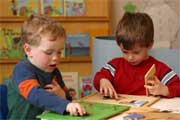|
| |
How to measure if children
are learning
Articles Page|
Edu.articles|
Education Page |
Courses and Careers|
Examinations dates

The New York Times News Service: As
children, teachers and parents sprint, slink or stumble into the new school
year, they also find themselves labouring once again in the shadow of
standardised tests. That is a real shame, given that there are few
indications that the multiple-choice format of a typical test, in which
students are quizzed on the specific formulas and bits of information they
have memorised that year, actually measures what we need to know about
children’s education.
There is also scant evidence that these tests encourage teachers to become
better at helping individual children; in fact, some studies show that the
tests protect bad teachers by hiding their lack of skill behind narrow goals
and rigid scripts. And there are hardly any data to suggest that punishing
schools with low test scores and rewarding schools with high ones improves
anything. The only notable feature of our current approach is that these
tests are relatively easy to administer to every child in every school, easy
to score and easy to understand. But expediency should not be our main
priority when it comes to schools.
Instead, we should come up with assessments that truly measure the qualities
of well-educated children: the ability to understand what they read; an
interest in using books to gain knowledge; the capacity to know when a
problem calls for mathematics and quantification; the agility to move from
concrete examples to abstract principles and back again; the ability to
think about a situation in several ways; and a dynamic working knowledge of
the society in which they live. This task is not as difficult as one might
think. In recent years, psychologists have found ways to measure things as
subtle as the forces that govern our moral choices and the thought processes
that underlie unconscious stereotyping. And many promising techniques used
by child development experts could provide a starting point for improving
school assessments.
For instance, using recordings of children’s everyday speech, developmental
psychologists can calculate two important indicators of intellectual
functioning: the grammatical complexity of their sentences and the size of
their working vocabularies (not the words they circle during a test, but the
ones they use in their real lives). Why not do the same in schools? We could
even employ a written version, analyzing random samples of children’s essays
and stories.
Psychologists have also found that a good way to measure a person’s literacy
level is to test his ability to identify the names of actual authors amid
the names of non-authors. In other words, someone who knows that Mark Twain
and J.K. Rowling are published authors — and that, say, Robert Sponge is not
— reads more. We could periodically administer such a test to children to
find out how much they have read as opposed to which isolated skills they
have been practicing for a test.
When children recount a story they have read or has been read to them, it
provides all kinds of information about their narrative skill, an essential
component of literacy. We could give students a book and then have them talk
with a trained examiner about what they read; the oral reconstruction could
be analyzed for evidence of their narrative comprehension.
Researchers have also found that the way a student critiques a simple
science experiment shows whether he understands the idea of controlling
variables, a key component in all science work. To assess children’s
scientific skills, an experiment could be described to them, in writing, and
then they would explain how they would improve upon it.
Of course, these new assessments could include some paper-and-pencil work as
well. But that work would have to measure students’ thinking skills, not
whether they can select a right answer from preset options. For instance,
children could write essays in response to a prompt like, “Choose something
you are good at, and describe to your reader how you do it.” That would
allow each student to draw on his area of expertise, show his ability to
analyse the process, describe a task logically and convey real information
and substance. In turn, a prompt of, "Write a description of yourself from
your mother’s point of view,” would help gauge the child’s ability to
understand the perspectives of others.
Finally, we don’t need to exhaustively track every child every year in order
to monitor how schools are doing. Just as researchers often use a randomly
selected group to provide a window onto the larger population, we could test
only carefully gathered representative samples from all the classes within a
few grades. We would still get an empirical snapshot of a school, while
freeing up students and teachers to do more meaningful work.
By shifting our assessment techniques, we would learn more of what we really
need to know about how children, teachers and schools are doing. And testing
could be returned to its rightful place as one tool among many for improving
schools, rather than serving as a weapon that degrades the experience for
teachers and students alike.
| |
|



